Yesterday’s GCSE results showed schools strongly switching students away from non-EBacc subjects as they try to fill up the Progress 8 EBacc slots. Religious Studies GCSE, which was controversially not deemed to be suitable as an EBacc humanity, is one subject bucking this trend with yet another year-on-year increase in entries.
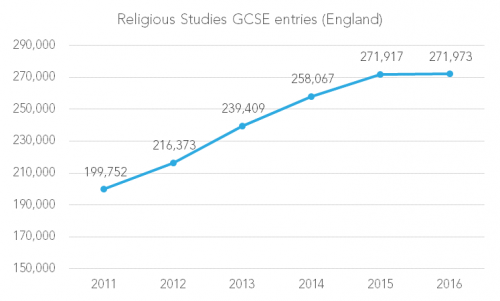
However, this is not a simple story of student attraction to studying a subject that seems so relevant to understanding the world we live in today. There are other factors at work.
First, whilst the proportion of 16 year olds in England taking a full GCSE in religious studies has risen (we estimate it was around 33% in 2011 and will be about 48% in 2016), the proportion taking any sort of RS qualification continues to fall. The religious studies short course GCSE was a hugely popular way of meeting the requirement for schools to provide a religious education at Key Stage 4. But it was excluded from counting in performance tables from 2013/14 onwards and, as a result, is steeply declining in popularity.
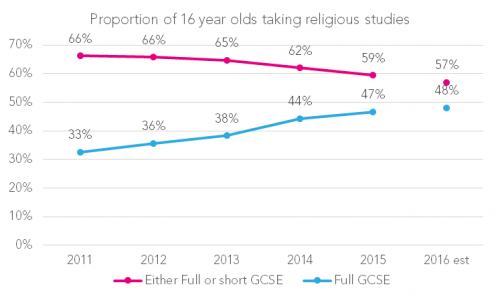
Secondly, the decision to take religious studies is often not made by the student themselves. We estimate that in 2015 over 40% of secondary schools required students to take either the full or short course GCSE in religious studies, with 29% requiring the full course (we designate a school as having compulsory religious studies if over 90% of students take the GCSE).
It should be of no surprise that compulsory GCSE religious studies is far more prevalent in schools with a religious designation – indeed it is almost universal in Roman Catholic schools. The chart below shows that the majority of pupil entries to a GCSE in religious studies are, by our estimates, made because the subject is compulsory at the school they attend. (Schools in London are also far more likely to provide universal religious studies GCSE, even if they are not religious schools.)

Religious leaders have pleaded for religious studies to be included as a permissible humanity in the EBacc and were rightly concerned that headteachers would perceive there to be a trade-off between meeting the requirements of the EBacc/Progress 8 and delivering a full religious education at Key Stage 4. Comfortingly, we really cannot see any evidence of this trade-off existing in the 2015 performance data.
The chart below shows the proportion achieving an EBacc humanity in history or geography. We plot it against the prior attainment of the school’s intake, separately for schools that deliver the universal full GCSE in religious studies versus those that do not. We see no differences in achievement in the humanity element of the EBacc here.

More generally, there is no evidence that the universal GCSE full RS entry is damaging a school’s Progress 8 score in 2015. Indeed, if anything the reverse seems to be true. (Little should be inferred from these correlations – they are not causal and there is considerable social selection taking place across different school groups here. Note that Progress 8 does have a social gradient – we re-run the analysis using a contextual value added version of Progress 8 that removes the gradient and the pattern still holds.)

So, to conclude:
- Numbers of pupils studying religious studies are falling because the short course continues to decline in use across schools
- This tells us nothing about interest in religious studies amongst pupils because most of those studying the subject are required to by their school
- Schools who continue to choose to deliver the full GCSE in religious studies to all their students do not appear to be disadvantaged in achieving a good Progress 8 score

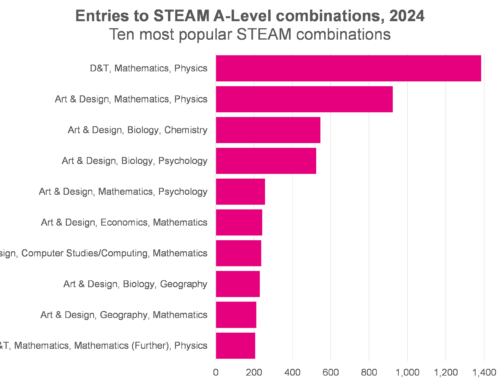
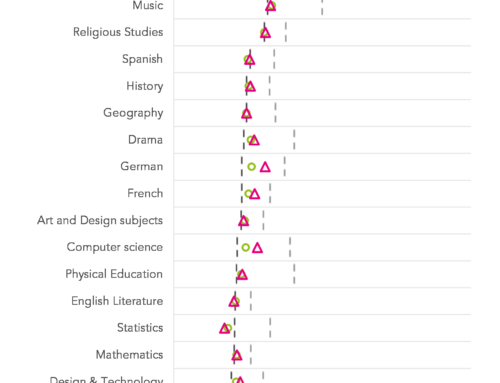
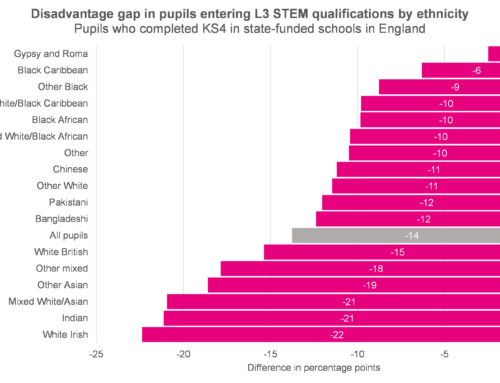
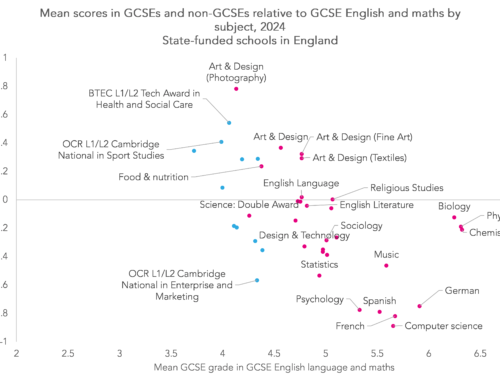
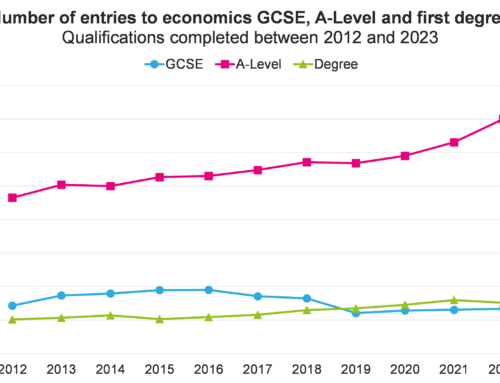
It may hit next year. At our school we had to find extra time for the new maths GCSE from somewhere, and full course RE for all had to go rather than lose an option.
This is very interesting to hear. We always learn about what is happening at schools with a rather long time lag!
What worries me is that with new, more demanding GCSE courses now being taken, the many schools who are trying to teach GCSE RS on less than expected time (e.g. one hour per week) will see their results crash. This is not good for student or teacher confidence and it may have a dramatic effect on how schools offer RS in the future.
Hi Rebecca
I’m dong research into the RE GCSE so thank you for this, it has been useful. As an RE teacher myself I have long been frustrated with those in the RE community using this rise to claim the the subject has simply grown massively in popularity. I do however believe that this is too simplistic:
“This tells us nothing about interest in religious studies amongst pupils because most of those studying the subject are required to by their school”
As it ignores the history of the short course GCSE, the most popular option through it and what determines whether the RS GCSE is ran in a School,
I’d be happy to chat further with you about my research.
Best regards,
Sam Collins
University of Sheffield
HI
I work in a Catholic school and we have been discussing the estimates FFT Aspire produces for RS. Is there any research that you have done/could do that shows the attainment of cohorts where RS is done by all/majority of the cohort against those taking it as an option subject?
This would be very interesting for us to look at as a school.
Regards
Matt